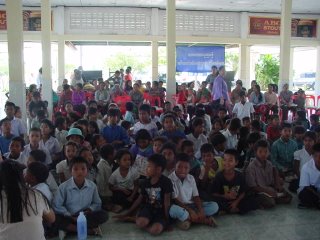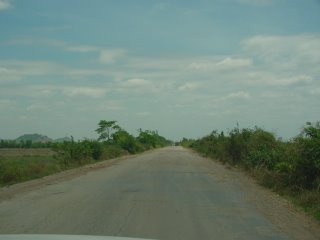Wild West country - Poipet
Ok so I'm back from Poipet. Poipet is a town on the border with Thailand. So much on the border in fact and immigration is in the town square. It is a filthy place. Rubbish is strewn everywhere. The place feels abandoned, as if it is not part of the rest of the country.
The road to Poipet is appalling. I have never experienced such roads - huge metre wide potholes and debris in the middle of the road. The last hour of the journey was bumpity bump and occasionally exclamations of shock at the size of the holes in the road. It is said that the government want to discourage people from using the land crossing because they earn more hard currency when people fly. It is $20 is arrive in or depart from Cambodia by air (one of the highest in the world), but just a couple of dollars for foreigners travelling by land. Incidentally it is 1000 riel or 25 cents for Cambodians to cross the border.
The entire journey was 6 hours 40 minutes to cover 360 kilometres. The final two hours took all the time apart from the occasional slamming of the brakes to prevent a pig or cow accident. The cows would not survive a clash with a Jeep – they are as skinny as supermodels. You can count each rib – I imagine Joseph’s skinny/fat cow dreams when I see them.
The land is dry. It seems parched. It appears incapable of supporting life and yet when the rains come, the colours will be vivid and I am told that the green of the rice paddies is a beautiful sight. All the houses are built on stilts (or on high pavements) in preparation for the rainy season.
My notion of going to Poipet was to accompany my boss and get a story out of it. I am a de facto journalist writing for the website and newsletter. The project in Poipet is concerned with victims of human trafficking. There was a community celebration because 75 former victims of child trafficking were graduating junior school. I interviewed one of the children.
Seila was eleven when she was stolen from her extremely poor family by a stranger who brought her over the border to Thailand. There she was obliged to beg or she would be beaten. She was there for six months before she escaped with a friend in the back of a car – she does not know in whose car she was. On crossing the border she was caught by Thai immigration and deported back to Cambodia where she was picked up by the transit centre and thus entered the UN system. She was fed, educated, housed, counselled, and reunited with her family. Yesterday she was awarded a special prize for her attendance at school. It is a brave story and she is a brave little girl who despite all that happened is still smiling.
I did several interviews and gleaning much interesting information. It will be published in the newsletter and online in due course. I might even try and get permission to publish in the Irish Times!
The children here are very much at risk of being retrafficked. Sometimes it is the parents who sell their children to the traffickers to buy enough food to live. These people live on less that $1 a day – it is more like 50 cents. It is as simple as a water filter. The children drink contaminated water and get sick. The parents incur debt to buy medicine. They have no way of paying the debt so the children are either sent out to beg to sold to traffickers. I admire S, the volunteer working with these children. She is doing a magnificent job and is really making a difference in the lives of these children.
I was well happy to leave that skanky border town and begin the bone shaking ride back to civilisation. Poipet felt like the Wild West, brutal, untamed, and dangerous, without the charm.
The road to Poipet is appalling. I have never experienced such roads - huge metre wide potholes and debris in the middle of the road. The last hour of the journey was bumpity bump and occasionally exclamations of shock at the size of the holes in the road. It is said that the government want to discourage people from using the land crossing because they earn more hard currency when people fly. It is $20 is arrive in or depart from Cambodia by air (one of the highest in the world), but just a couple of dollars for foreigners travelling by land. Incidentally it is 1000 riel or 25 cents for Cambodians to cross the border.
The entire journey was 6 hours 40 minutes to cover 360 kilometres. The final two hours took all the time apart from the occasional slamming of the brakes to prevent a pig or cow accident. The cows would not survive a clash with a Jeep – they are as skinny as supermodels. You can count each rib – I imagine Joseph’s skinny/fat cow dreams when I see them.
The land is dry. It seems parched. It appears incapable of supporting life and yet when the rains come, the colours will be vivid and I am told that the green of the rice paddies is a beautiful sight. All the houses are built on stilts (or on high pavements) in preparation for the rainy season.
My notion of going to Poipet was to accompany my boss and get a story out of it. I am a de facto journalist writing for the website and newsletter. The project in Poipet is concerned with victims of human trafficking. There was a community celebration because 75 former victims of child trafficking were graduating junior school. I interviewed one of the children.
Seila was eleven when she was stolen from her extremely poor family by a stranger who brought her over the border to Thailand. There she was obliged to beg or she would be beaten. She was there for six months before she escaped with a friend in the back of a car – she does not know in whose car she was. On crossing the border she was caught by Thai immigration and deported back to Cambodia where she was picked up by the transit centre and thus entered the UN system. She was fed, educated, housed, counselled, and reunited with her family. Yesterday she was awarded a special prize for her attendance at school. It is a brave story and she is a brave little girl who despite all that happened is still smiling.
I did several interviews and gleaning much interesting information. It will be published in the newsletter and online in due course. I might even try and get permission to publish in the Irish Times!
The children here are very much at risk of being retrafficked. Sometimes it is the parents who sell their children to the traffickers to buy enough food to live. These people live on less that $1 a day – it is more like 50 cents. It is as simple as a water filter. The children drink contaminated water and get sick. The parents incur debt to buy medicine. They have no way of paying the debt so the children are either sent out to beg to sold to traffickers. I admire S, the volunteer working with these children. She is doing a magnificent job and is really making a difference in the lives of these children.
I was well happy to leave that skanky border town and begin the bone shaking ride back to civilisation. Poipet felt like the Wild West, brutal, untamed, and dangerous, without the charm.




No comments:
Post a Comment